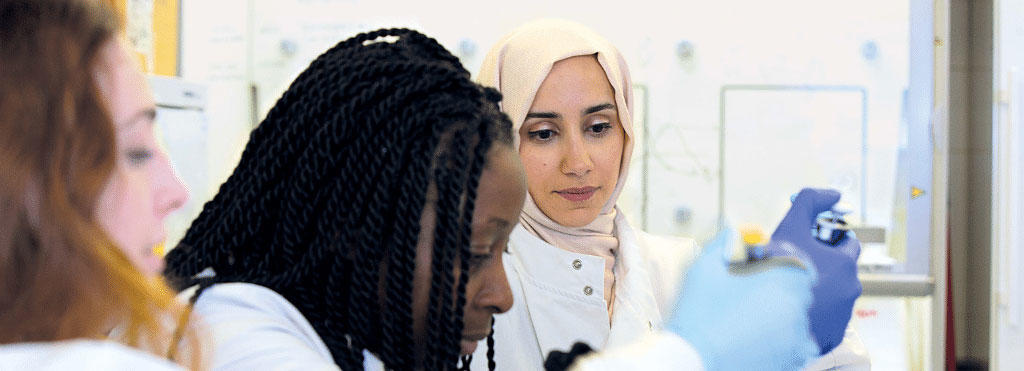Equality, diversity and inclusion in research

At Cancer Research UK, we believe your success as a researcher should be determined by the quality of your science – and nothing else. We are committed to creating equal, diverse and inclusive research environments that enable all brilliant minds to come together, thrive and progress.
A robust evidence base is the first step in identifying barriers to individuals participating and thriving in cancer research – and it’s how we can make sure we’re taking the most effective action to improve equality, diversity and inclusion (EDI) in the research we fund. That’s why we’re one of the UK’s first charity research funders to publish diversity data in our grant funding.
Our EDI in research action plan lays out our commitments as a funder to develop a more diverse and inclusive research community and contribute to tackling systemic issues like underrepresentation and racial bias.
Diversity is integral to excellence. By creating an inclusive and diverse community of cancer researchers, we will not only support the brightest minds to thrive and collaborate, we will further our mission of beating cancer – for everyone.

As a major research funder, we want to lead by example, use our influence and work collaboratively to make cancer research available to all the best researchers. Fixing the system will take time and a collaborative effort – among institutions, funders, and individual researchers. But we’ll listen, we’ll learn, and we’ll continue to work with others to create the culture change we want to see.
Iain Foulkes
Executive Director for Research & Innovation
Executive Board Sponsor, CRUK Race Equality and Equity Network
Reducing cancer inequities
Beating cancer means beating it for everyone. Cancer doesn’t affect everyone equally and we want to make sure our research considers this. Reducing cancer inequities across the whole cancer care pathway is a key principle of our research strategy.
We have:
- as part of Cancer Grand Challenges, launched a cancer inequities challenge to understand genetics, biology, and social determinants affecting cancer risk and outcomes in diverse populations.
- already funded several research projects to address cancer inequalities, for example, Dr Tanimola Martin’s research into ethnic inequality in diagnosis and outcomes of cancer.
- set and reviewed new expectations for research involving human participants to recruit a diverse group of participants and remove potential barriers to participation.
- published a new sex in experimental design requirement to incorporate male and female sexes of animals, tissues or cells into experiments.
- launched a consultation with researchers and members of the public to inform our plans – thank you to 1,400 of you who responded.
EDI in research news
Women in Science: Celebrating with our Women of Influence initiative
Our Women of Influence mentoring scheme supports the career development of our exceptional female scientists by pairing them with leading businesswomen who can provide insights from outside academia.
Introducing our new narrative CV format
We’ve rolled out a narrative-based CV to ensure we’re attracting and retaining the full range of the most promising research and innovation talent.
Opportunity for early- to mid-career researchers to observe our panel and committee meetings
Early to mid-career researchers can observe our panels and committees that includes positive action to offer individuals from ethnic minority backgrounds and women priority places.
Takeaways from the inaugural Black in Cancer conference
Read about our highlights from this event in collaboration with Black in Cancer that brought together scientists, advocacy groups and partners to interact, build collaborations and join impactful conversations.
Partnership with In2scienceUK: inspiring the next generation of cancer researchers
We've partnered with In2scienceUK, an organisation promoting social mobility and diversity in STEM. Each Summer, we sponsor 10 young people through mentoring and also help improve access to postgraduate research for people from low socioeconomic backgrounds.
Our commitment to EDI across Cancer Research UK
Our diversity data report and EDI in research action plan are part of our organisation-wide EDI strategy to make Cancer Research UK the best charity it can be, which reflects the communities we serve, and that people are proud to work and volunteer for.




